RxSafe Podcast Series
RxSafe’s core values guide everything they do, every day. They represent the qualities we look for in the people they hire, their beliefs about how they conduct business, and aspiration to ensure customers are satisfied. RxSafe believes in challenging conventional wisdom, upending the status quo, and developing technology that will define the future of the retail pharmacy industry. Creating comprehensive, long-term solutions for our customers takes vision, innovation, and out-of-the-box thinking. The RxSafe team accepts nothing less. RxSafe has partnered with the global leading podcast network dedicated to the business & profession of pharmacy, the Pharmacy Podcast Network, to deliver the best content about pharmacy technology automation & medication adherence support.
Episodes

Tuesday Jul 19, 2022
Tuesday Jul 19, 2022
We believe that local independent community pharmacy has a much wider role to play in future home-care. Historically, pharmacists have not been included on home care teams, despite the fact that home care patients require more pharmacy care services and frequently experience medication errors.
There’s an opportunity for Community Pharmacies to deliver more in-home care services. LTC pharmacies are compensated for services which many community pharmacies provide to their home-bound patient base.
The optimal service delivery model of community pharmacies and distribution of additional clinical care for home care is a prime opportunity.
Special thanks to our episode sponsor RxSafe, leaders in Medication Adherence packaging & partners of Independent Community Pharmacy.
Guests:
Ronna Hauser, PharmD
SVP Policy & Pharmacy Affairs at NCPA
Susan Rhodus, BS Pharm
Senior Vice President, Contracts and Advocacy at GeriMed
Joe Williams, PharmD
Owner at Brisson Drugs
References:
https://ncpa.org/medical-home-mah
Learn more about your ad choices. Visit megaphone.fm/adchoices

Thursday Apr 14, 2022
Thursday Apr 14, 2022
RxSafe | Heart Health Panel Discussion
Panelists:
Sandra Awaida, PharmD
Jennifer Marquez, PharmD
Dr. Nathan S. Bryan, PhD
Brittany R. Messer, PharmD
The pharmacist plays an important role in the prevention of cardiovascular diseases, mainly through patient education, counseling, detection, and control of specific risk factors.
Join RxSafe as we present experienced pharmacists and experts who will share their knowledge of best practices that have a direct impact on heart health outcomes that community pharmacies can implement in their practices.
Dr. Messer is a clinical pharmacy specialist practicing with the cardiology department at Marshall Health. She completed residency at the VA Medical Center in Huntington, West Virginia, where she gained experience with heart failure medication optimization, anticoagulation management and cardiovascular disease state management, such as lipids and hypertension, in both the inpatient and ambulatory settings. Dr. Messer currently works closely with the heart failure clinic and general cardiology at Marshall Cardiology.
Dr. Awaida is founder of PreciGenX, a company that helps other physicians and pharmacists grow their businesses by incorporating CCM, RPM, and PGx services in their practices. She utilizes patient monitoring and evidence-based pharmacotherapy and pharmacogenomics to prevent, predict and personalize medication therapy to improve outcomes for her patients.
Dr. Marquez is an experienced, residency-trained, oncology board-certified, and PGx-certified pharmacist. She is passionate about helping patients and providers overcome drug therapy challenges.
Dr. Bryan was the first to describe nitrite and nitrate as indispensable nutrients required for optimal cardiovascular health. Dr. Bryan has published a number of highly cited papers and authored or edited 5 books. He is an international leader in molecular medicine and nitric oxide biochemistry.
Panel Overview:
Cardiovascular disease is highly prevalent, affecting 4 of every 10 Americans, and its costs are expected to exceed $1.1 trillion by 2035, noted from a study published by the Journal of American Heart Association.
The pharmacist plays a relevant role in primary and secondary prevention of cardiovascular diseases, mainly through patient education and counseling, drug safety management, medication review, monitoring and reconciliation, detection and control of specific cardiovascular risk factors and clinical outcomes.
Pharmacists can be a key source of support for individuals looking to manage their heart health. Many of the conditions that increase the risk of heart disease require medication to treat, and taking those medications as prescribed can help reduce the risk of a cardiovascular event.
This discussion is about the panelists experience and knowledge of heart health best practices, suggested supplements like Nitric Oxide, lowering cholesterol, and many other topics which have a direct impact on heart health education and programs for Community Pharmacies to implement in their practices.
What is the link between cholesterol and heart disease?
Many years of scientific studies have shown a close relationship between cardiovascular disease and cholesterol levels. Your doctor may request a lipid profile—a test that shows the levels of LDL (bad cholesterol), HDL (good cholesterol), and triglycerides in your blood—to assess your risk for developing heart disease.
What about the risk of liver damage from taking statin medications?
The frequency of liver problems with statin therapy is actually quite low. Less than 1 percent of people have to stop taking statins because they develop liver problems. Long-term trials have confirmed the safety of statins—the latest guidelines do not suggest a need to monitor people on statins who have normal liver function. In addition, in some cases where there is evidence of fat deposits in the liver, statin therapy may actually improve liver function tests.
Learn more about your ad choices. Visit megaphone.fm/adchoices
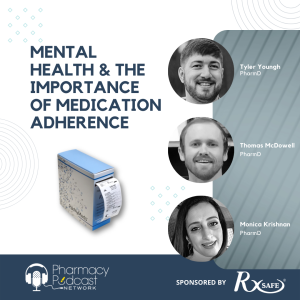
Wednesday Jan 19, 2022
Wednesday Jan 19, 2022
Synopsis: Major psychiatric disorders are a growing public health concern that attributed to 14% of the global burden of diseases. The management of major psychiatric disorders is challenging mainly due to medication non-adherence.
There seems to be a scarcity of summarized evidence on the prevalence of psychotropic medication non-adherence and associated factors. Psychiatric disorders have been a global public health challenge. Almost 450 million people are affected by psychiatric disorders worldwide.
Psychiatric disorders cost approximately $2.5 trillion dollars in 2010 and are expected to rise up to $6.0 trillion by 2030. Mental health disorders are surprisingly common in the United States. Nearly one in five U.S. adults live with a mental health illness, that’s 51.5 million people in 2019. Mental illnesses include many different conditions that vary in degree of severity, ranging from mild to moderate to severe. Lost resources and production, unemployment, absences from work, and premature death are some of the indirect economic costs.
Therefore, we’re excited to discuss this important topic today with three Pharmacist’s focused on Mental Health in their communities and practices.
Tyler Young RPh, is the lead pharmacist with Hines Prescription Shop, a locally-owned pharmacy in Barnesville, Georgia. Tyler helps hundreds of patients become more compliant with their medications by making it simpler with RxSafe Adherence packaging.
Dr. Thomas McDowell, PharmD, is the owner of McDowell’s Pharmacy in North Carolina. Thomas and I have been on several panel discussions in the past, both LIVE in person, and on Zoom. We value Thomas’s insights & look forward to his experiences helping patients with mental health conditions.
Dr. Monica Krishnan, PharmD, is a clinical pharmacist with a practice of over 18 years. She began her career as a inpatient critical care pharmacist at UCLA medical center in 2002. After starting a family and suffering the loss of her husband at a young age, Dr Monica switched paths and joined the field of community pharmacy.
Monica is a personal friend of mine, a member of the Pharmacy Podcast Network leading our ‘Pharmacists Focused on Mental Health’ podcast and currently works with the Walmart Health & Wellness team in Los Angeles.
Dr. Monica plans to continue to spread awareness and education on mental health and hopes to continue working and collaborating with other mental health advocates. She has an incredibly active Instagram which is focused on mental health advocacy.
Learn more about your ad choices. Visit megaphone.fm/adchoices
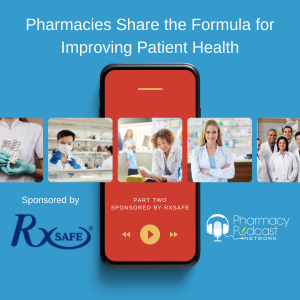
Friday Dec 03, 2021
Friday Dec 03, 2021
PART TWO
During the 2021 NCPA Annual Conference, Todd Eury leads a panel discussion of Pharmacy Owners who provide insights to leveraging RxSafe technologies in their pharmacies & enhancing patient medication adherence.
Learn more about your ad choices. Visit megaphone.fm/adchoices
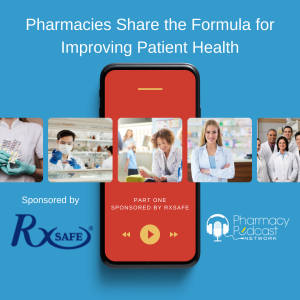
Friday Dec 03, 2021
Friday Dec 03, 2021
PART ONE
During the 2021 NCPA Annual Conference, Todd Eury leads a panel discussion of Pharmacy Owners who provide insights to leveraging RxSafe technologies in their pharmacies & enhancing patient medication adherence.
Learn more about your ad choices. Visit megaphone.fm/adchoices
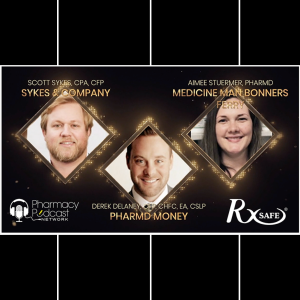
Friday Nov 05, 2021
Friday Nov 05, 2021
The Section 179 tax deduction has helped small businesses offset the cost of capital equipment for years. The dysfunction in Congress has frequently caused the statutory purchase limit to seesaw until just before year-end. But, the good news is the IRS Section 179 purchase price limit of $500,000 was made permanent law in 2016 with the passage of the PATH act.
In 2017 the deduction limit for Section 179 increased to $1 million for 2018 and beyond. The limit on equipment purchases increased to $2.5 million.
Furthermore, the bonus depreciation is: 100%
After calculating your potential Section 179 savings below, call us today at (877) 978-2364 or fill out the form to the right. We’d love to learn more about your pharmacy and let you know the many ways the RapidPakRx can increase your profitability.
Special Guests:
Pharmacy Owner: Aimee Stuermer PharmD
Pharmacy CPA & Accounting Expert: Scotty Sykes w/ Sykes & Company
Pharmacist Financial Planner: Derek Delaney w/ PharmD Financial Planning
Learn more about your ad choices. Visit megaphone.fm/adchoices
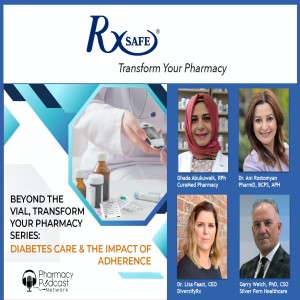
Friday Oct 01, 2021
Friday Oct 01, 2021
Beyond the Vial, Transform Your Pharmacy Series: Diabetes Care & The Impact of Adherence
34.2 million Americans have diabetes. People want reliable information & education on better management of their diabetes. Many people feel challenged in accessing credible information about controlling their diabetes and for those who reside in rural or underserved communities, this issue is compounded.
Community pharmacies are more accessible to patients than most primary care providers and serve as an ideal setting for the delivery of health education. This webinar & podcast will help pharmacists and pharmacy owners understand the opportunity to build a more robust diabetes management program including education, monitoring, and medication adherence with a goal to provide patients with a positive impact on overall metabolic control.
Panelist Speakers:
Ghada Abukuwaik RPh | Owner at CureMed Pharmacy
Ghada Abukuwaik is the Head Pharmacist, President, and owner of CureMed Specialty Pharmacy in Clifton, NJ. CureMed offers point-of-care testing services and offers a Diabetes Self-Management Education program, as well as workshops on cholesterol management and nutrition, among others.
Dr. Ani Rostomyan PharmD, BCPS, APH
Dr. Ani Rostomyan is a Board-Certified Clinical Pharmacist and Holistic Health Coach specializing in Diabetes management and offers Pharmacogenomics consulting. Dr. Rostomyan has her own functional wellness practice that emphasizes personalized medicine, lifestyle choices, and a holistic guilt-free nutritional approach to health.
Dr. Lisa Faast CEO DiversifyRx
Dr. Lisa Faast is an innovator, an experienced business executive, and a leader in the independent pharmacy industry. With over 20 years of experience as a pharmacy owner, consultant, compounder, and businesswoman, Lisa is passionate about helping independent pharmacy owners thrive by focusing on diversifying and growing revenue streams.
Garry Welch PhD, CSO SilverFern
Dr. Garry Welch is the Co-Founder and Chief Scientific Officer of Silver Fern Healthcare. A foremost expert in the area pf behavior medicine for chronic disease care, Dr. Welch has 30+ years of clinical research experience on behavior change strategies for people with diabetes.
About the PPN:
The Pharmacy Podcast Network is the global leader in podcast content for the Business & Profession of Pharmacy. Since March 2009, the Pharmacy Podcast was the first audio blog for the pharmacy industry and has developed into a directory of over 40+ podcasts with different vertical informational themes.
Collectively, over 2.5M downloads, more than 2,000+ episodes, and 30+ participating Pharmacists and Pharmacy Professionals hosting the podcasts.
SHOW LESS
Learn more about your ad choices. Visit megaphone.fm/adchoices
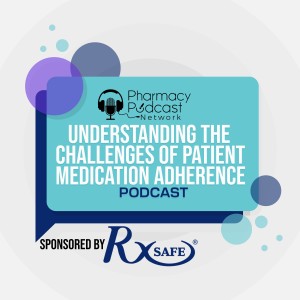
Wednesday May 12, 2021
Wednesday May 12, 2021
Background: Positive associations between medication adherence and beneficial outcomes primarily come from studying filling/consumption behaviors after therapy initiation. Few studies have focused on what happens before initiation, the point from prescribing to dispensing of an initial prescription. Objective: to provide guidance and encourage high-quality research on the relationship between beneficial outcomes and initial medication adherence (IMA), the rate initially prescribed medication is dispensed. Using “Initial Medication Adherence” IMA rigorously & include providing convincing evidence that initial prescribing and dispensing events are identified, supplemental parameters incorporating perspective and substitution biases are addressed, and contextual parameters are included. Medications are the most common treatment regimen used in ambulatory health care. Yet, adhering to prescribed medications is a major issue affecting health care because nonadherence has been associated with worsening clinical symptoms and disease progression. Furthermore, medication nonadherence has been linked to increased health care visits, services, and costs. Studies linking nonadherence to these unfavorable outcomes have used various operational definitions for adherence—each with its own nomenclature (e.g., persistence), several representing similar if not exact components of medication adherence, which we call initial medication adherence (IMA). For example: the IMA process begins with a prescriber and patient interaction in an emergency room/ department, hospital, or other clinic setting (step 1) that results in a prescribing event (step 2)—the first of the two key events needed for an IMA measurement. When a prescribing event occurs, data collected from the perspective of either a prescriber or a patient will capture it, whereas data collected from the perspective of a pharmacist will not. To qualify as IMA, however, the prescribing event must relate to a patient’s first prescription within a therapeutic class (step 4). Otherwise, the dispensing event becomes part of a PIMA metric (step 5). Data from either the patient or the prescriber should be able to determine whether the prescribing event is an initial event. The pharmacist becomes aware of prescribing events only when these events are communicated to the pharmacist for filling (step 6). Therefore, the pharmacist does not know how many prescribing events have occurred, only how many have been communicated. However, once the pharmacist receives the prescription (step 7) and fills it (step 8), the pharmacist must dispense the prescription to the patient (step 9). The dispensing event is the second key event needed for measuring IMA (step 10). With dispensing the medication to the patient, both the pharmacist and the patient know that the IMA is achieved, but the prescriber does not. If a pharmacist does not dispense a filled prescription, the prescription becomes abandoned to the pharmacist and is restocked (step 11). If an abandoned prescription is not transferred to another pharmacist (step 12) and subsequently dispensed, the patient will be initially nonadherent (step 13). Either the pharmacist or the prescriber may transfer the prescription from one pharmacy to another, but neither may know that the prescription has been dispensed. — How can pharmacists use the IMA process in communications with physicians? — Explain how pharmacists can educate patients about better adherence with their initial prescriptions—What are the main reasons for medication non-adherence? See omnystudio.com/listener for privacy information.
Learn more about your ad choices. Visit megaphone.fm/adchoices
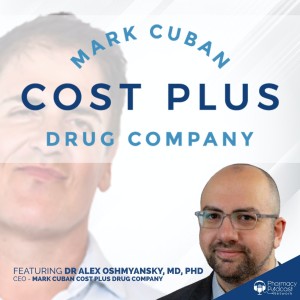
Friday Mar 05, 2021
Friday Mar 05, 2021
RxSafe & ApproRx have sponsored a gathering of 200+ pharmacy owners interested in learning more about a drug manufacturer interested in working directly with Pharmacy owners. Thanks to Bruce Kneeland and Todd Eury for hosting this LIVE presentation from March 2nd 2021.
Today was the 12th anniversary of the Pharmacy Podcast Network. The 1st podcast about the profession of pharmacy launched episode 1 on March 2nd 2009. Today the PPN has 30+ hosts & is dedicated to the success of our pharmacists & pharmacy techs.
Alex Oshmyansky, MD, PhD is the CEO & Founder at Mark Cuban Cost Plus Drug Company.
Dr. Alex along with strategic investor & business mogul Mark Cuban has launched Mark Cuban Cost Plus Drug Company, a pharmaceutical company that plans to make less expensive versions of selected generic drugs. The company's first drug is a generic version of albendazole, an antiparasitic drug used to treat hookworm. Treated early, two tablets will treat the infection; left untreated, cognitive defects and neurological problems can result.
Cost Plus Drug Company is dedicated to producing low-cost versions of high-cost generic drugs.
In this interview, Dr. Alex pledges to provide radical transparency in how they price their drugs. Dr. Alex has committed letting everyone know what it costs to manufacture, distribute, and market drugs to pharmacies. They will add a flat 15% margin to get wholesale prices. This will help to ensure they remain viable and profitable. There are no hidden costs, no middlemen, no rebates only available to insurance companies. Everybody gets the same low price for every drug they make.
The Pharmacy Podcast Network is the global leader in podcast content for the Business & Profession of Pharmacy. Since March 2009, the Pharmacy Podcast was the first audio blog for the pharmacy industry and has developed into a directory of over 25+ podcasts with different vertical informational themes. Collectively, over 2.5M downloads, more than 2,000+ episodes, and 30+ participating Pharmacists and Pharmacy Professionals hosting the podcasts.
Learn more about your ad choices. Visit megaphone.fm/adchoices
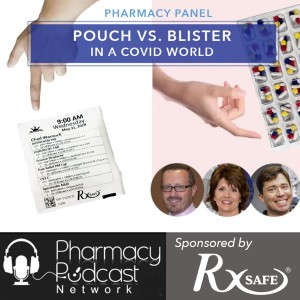
Tuesday Dec 08, 2020
Tuesday Dec 08, 2020
These days, your patients may be wondering, "How many people touch these pills before I take them?!" COVID-19 has increased pressure on healthcare providers to consider the use of “touchless technology” and other best practices to reduce disease transmission and keep patients safe.
This podcast episode will discuss consumer demand for 'no contact' medication packaging, and how you can differentiate your pharmacy and increase customer loyalty by providing safe, accurate, and untouched prescriptions.
As compliance packaging becomes increasingly popular, pharmacy owners are starting to look at dispensing costs -- not in terms of drug wholesale costs, rebates and DIR fees -- but in terms of vials versus blisters, or vials versus pouches.
After all, reimbursement doesn't change based on the packaging. The patients are prescribed the same NDCs, and their copay is the same regardless of whether the drugs go into a little amber bottle, a 7-day blister pack, or a strip of pouches labeled, ‘morning,’ ‘afternoon,’ and ‘evening.’
But what about your pharmacy costs, and specifically your dispensing costs -- including labor and materials -- for getting the scripts into the patients’ hands?
Regular readers of our blog may remember we already conducted a deep dive into the cost of strip packaging consumables last year. Consumable costs for our RapidPakRx™ strip packaging system are demonstrably lower than competing systems.
Special Guests:
Joe Williams, Brisson Pharmacy
Roberta Vining, Riley's Drugs
See omnystudio.com/listener for privacy information.
Learn more about your ad choices. Visit megaphone.fm/adchoices
